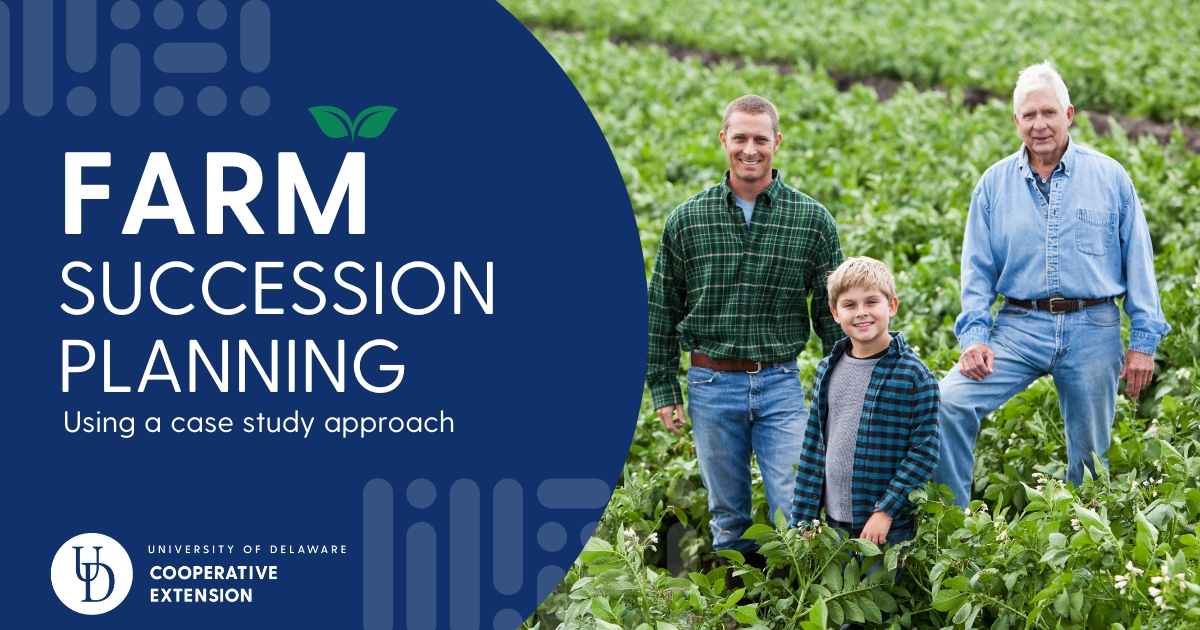
Category: Cooperative Extension

Farm Succession Planning – Using a case study approach
June 11, 2024 Written by Laurie Wolinski, Extension Agent lll – Agribusiness Risk Management
University of Delaware Cooperative Extension has recently taken an alternative approach to offering farm succession planning workshops. In cooperation with the University of Maryland Agriculture Law Education Initiative and Delaware Farm Service Agency, a team of educators developed a high school educational program on farm succession planning. The idea to introduce students to the topic came about during a 2018 day-long forum, “Linking Farm Vitality and Health,” that was held to share important information that would ultimately strengthen the health and well-being of farmers, their families and workers. One of the small breakout groups discussed and developed a project addressing the topic of succession planning.

High school program
As Extension educators, we often hear from the farm community that succession planning education is needed. Yet most workshops on the topic have low attendance, and there are a multitude of reasons for this. First, it’s a private and complicated process. We hear that some farmers put it off because it takes “so much time and money”. We also hear that the family has just “not sat down to talk about it – together.” So, unfortunately, there are situations when succession planning is put off so long that the true intentions of the older generation and the hopes of the younger generation are not met. The goal of the high school program is to offer a picture of how a family may adapt and change over time to keep their farm viable and profitable and keep the farm family happy and healthy through communication and succession planning.

Concept of succession planning
The high school program begins by introducing students to the concept of succession planning. In this curriculum we stress that it is part of the process of passing the farm to the next generation and, just as importantly, that it should serve as the base of a healthy and thriving farm and family. The students are quickly introduced to a real-life case study about a five-generation family that successfully writes a plan and follows it. The case study is comprehensive in that it involves the entire family and demonstrates a healthy, productive farm with a strong foundation. The students then participate in a hands-on exercise where they build the foundation of a healthy farm using building blocks that are prelabeled with characteristics of resilient farms. After they build the foundation, scenarios are presented that cause some of the blocks to be pulled; will the structure be resilient? That is what is discussed.

Farm decision-making
Students are then introduced to another case study. A fictitious, three-generation farm on Delmarva that illustrates, over a span of 20 years, the typical ups and downs, challenges and opportunities and the role of planning and decision-making on a farm. Students learn that a succession plan transfers the leadership of the farm business and illustrates how it helps to identify the roles and responsibilities of the current and future leadership; and how it can help reduce the number of unknowns in the situation of death, sickness or injury; and how the process increases the opportunities and provides reasons for communication. They are also introduced to several types of technical service providers and how they support farm decision-making and succession planning. The scenarios begin about 20 years before the older generation plans to retire through two years before that same generation’s retirement. Over this timeframe, the case study shows how roles and situations can change and how the family and farm can be successful. Activities support the review of typical farm family scenarios, and using written and discussion questions, students engage in a guided learning environment. Sometimes they role play, taking on character roles (family members) to discuss perspectives, and other times they work together to address a specific task.

The case study emphasizes business planning, family communication, the difference between fairness and equality, business structures and resilience. By introducing high school-age students to farm succession planning, we hope that they can discuss the topic with their family members, that it will encourage engagement in the process sooner rather than later and that the concepts the students learn will serve them in many facets of life.
For more information about this project, please contact Laurie Wolinski, University of Delaware Extension Educator – LGW@udel.edu.
